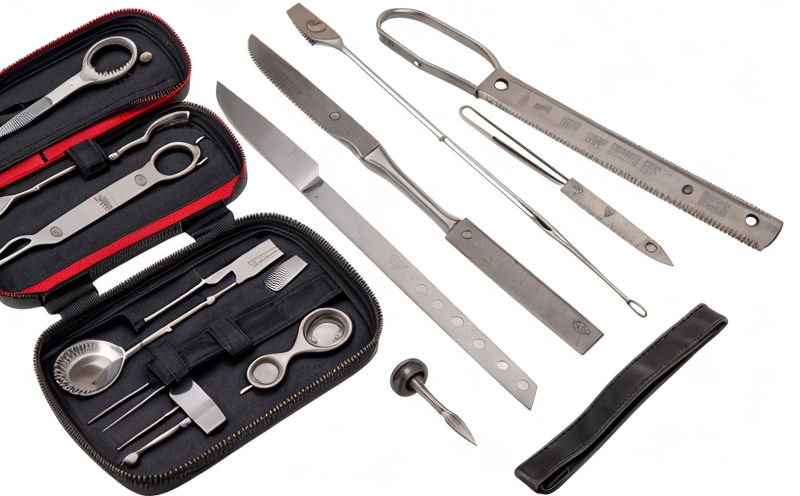Biocompatibility Testing of Surgical Instrument Materials
In the realm of medical devices and surgical instruments, ensuring safety and efficacy is paramount. Biocompatibility testing is a critical component in this process, designed to evaluate whether materials used in surgical tools are safe for human contact without causing adverse reactions. This service ensures that surgical instrument materials do not elicit harmful immune responses or toxic effects when they come into direct contact with the body.
The biocompatibility of materials is assessed through various testing protocols aimed at evaluating biological performance, including cytotoxicity, sensitization, and local irritation tests. These tests are crucial for ensuring that the materials used in surgical instruments meet regulatory standards and are safe for patient use. Compliance with international standards such as ISO 10993-5 (Cytotoxicity) and ISO 14155:2016 (Good Clinical Practice) is essential to ensure product safety.
For quality managers, compliance officers, R&D engineers, and procurement teams, this service offers a robust framework for ensuring that surgical instruments meet regulatory requirements. By leveraging the expertise of accredited laboratories equipped with state-of-the-art testing facilities, we provide accurate and reliable results that help clients navigate complex regulations and market demands.
The importance of biocompatibility cannot be overstated in the medical device industry, where even minute issues can have significant implications for patient safety. Our comprehensive approach ensures that every aspect of material interaction with biological systems is considered during testing. This service not only helps in meeting regulatory requirements but also enhances product design and innovation by providing insights into potential risks and opportunities.
Our team of experts uses advanced instrumentation to perform these tests, ensuring precision and reliability. The results are reported back to clients with detailed explanations of the findings, enabling informed decision-making processes. This service is part of a broader suite of testing solutions aimed at supporting the development, validation, and compliance of medical devices.
- Compliance with ISO 10993-5 (Cytotoxicity) ensures that materials do not release harmful substances into the body.
- ISO 14155:2016 provides a framework for good clinical practice in the design, development, and testing of medical devices.
- Testing for sensitization helps identify potential allergenic properties that could lead to adverse reactions.
- Evaluation of local irritation tests ensures that materials do not cause skin or tissue damage upon contact.
In summary, biocompatibility testing is a cornerstone in the development and validation of medical devices. It provides critical data for regulatory approval and helps ensure patient safety by identifying potential risks early in the design process. Our service offers comprehensive support to clients in ensuring that their surgical instruments meet the highest standards of biocompatibility.
Applied Standards
The biocompatibility testing of surgical instrument materials is governed primarily by international standards such as ISO 10993-5, which focuses on cytotoxicity tests. This standard requires that materials used in medical devices do not release harmful substances into the body when subjected to physiological conditions. Another critical standard is ISO 14155:2016, which provides guidelines for good clinical practice and ensures that testing protocols are robust and reproducible.
ISO 10993-10 covers bacterial adhesion tests, ensuring that materials do not support the growth of bacteria. Additionally, ISO 17605 addresses extraction of substances from medical devices under specified conditions, which is crucial for assessing potential leachables or extractables. These standards are designed to provide a comprehensive framework for evaluating the biological performance and safety of surgical instrument materials.
For clients focused on specific regions, we also offer compliance with regional standards such as EN ISO 10993-5 for European markets. Ensuring that your products meet these standards is essential for successful market entry and regulatory approval in various countries.
Industry Applications
The biocompatibility testing of surgical instrument materials finds application across numerous sectors within the medical device industry. Surgeons, healthcare providers, and patients rely on the safety and efficacy of these instruments, making it crucial to ensure that they meet stringent regulatory requirements.
In orthopedics, the use of biocompatible materials ensures that joint replacements or bone fixation devices do not cause adverse reactions. In neurosurgery, where precision is critical, ensuring that tools are free from toxic substances helps minimize surgical risks. Similarly, in cardiology, catheters and other interventional devices must be biocompatible to ensure safe passage through the body's vasculature.
The results of biocompatibility testing can also influence material selection for new products, guiding engineers towards safer and more effective materials. This service not only supports regulatory compliance but also enhances product design by identifying potential risks early in the development process. By adhering to these standards, manufacturers can ensure that their surgical instruments meet the highest levels of safety and efficacy.
Why Choose This Test
- Regulatory Compliance: Ensure compliance with international standards such as ISO 10993-5 and ISO 14155:2016, which are essential for regulatory approval.
- Patient Safety: Avoid risks associated with toxic or allergenic materials that could cause adverse reactions during surgical procedures.
- Product Innovation: Identify potential risks early in the design process and guide material selection towards safer alternatives.
- Rapid Turnaround: Our experienced team delivers accurate and reliable results, ensuring timely product launch schedules.
- Comprehensive Reporting: Detailed reports provide insights into test parameters, specimen preparation, and instrumentation used for the testing process.
- Expertise in Instrumentation: Leveraging advanced equipment ensures precision and reliability in biocompatibility testing.
- Compliance with Regional Standards: We offer compliance with EN ISO 10993-5, ensuring successful market entry in European markets.
Choosing this test ensures that your surgical instruments meet the highest standards of safety and efficacy. By partnering with our accredited laboratory, you can trust in accurate and reliable results that support regulatory approval and enhance product design.





